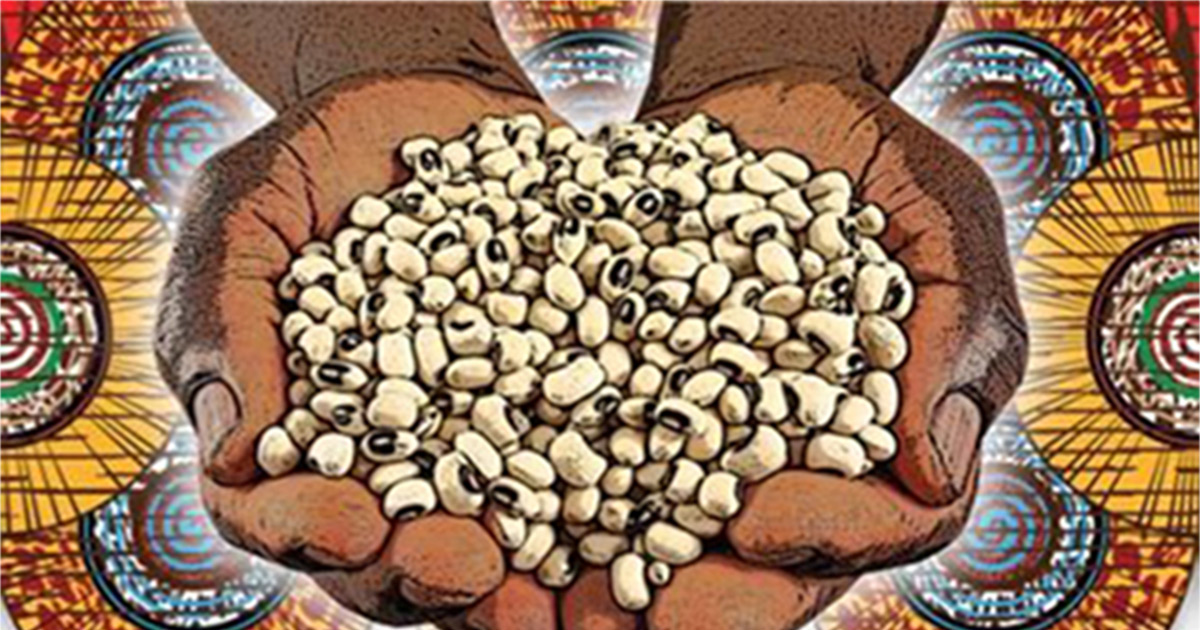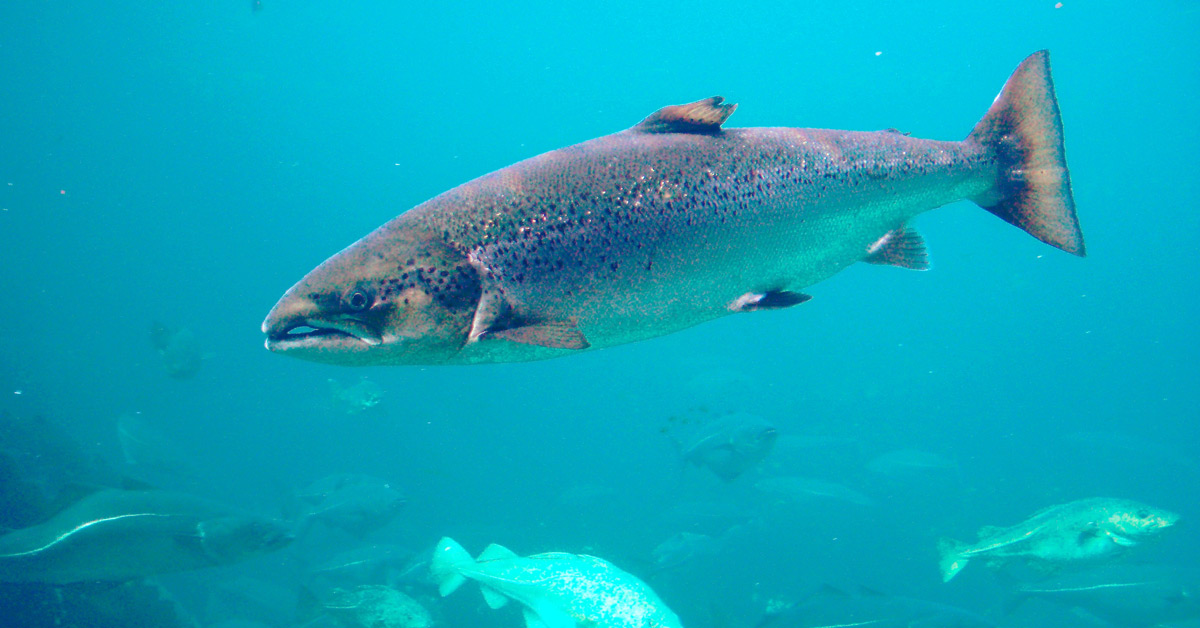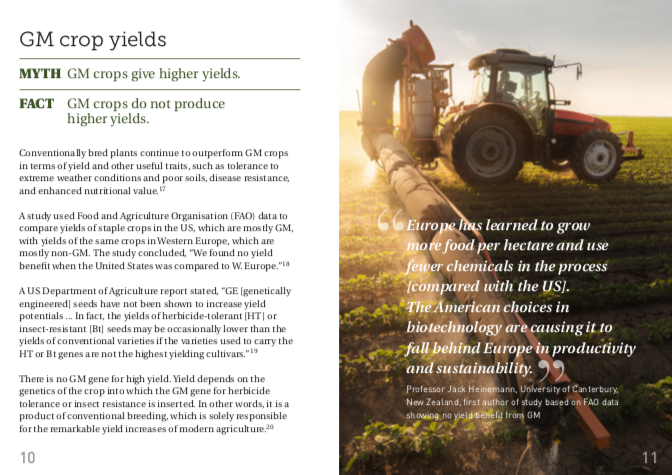India deregulates some gene-edited plants
The Indian government has exempted certain types of gene-edited plants from the country's GMO regulations. The change in rules will allow gene-edited plants without any “foreign” genes to be subjected to a weaker regulatory process. Two categories of gene-edited products — in which genes are either disrupted to make them non-functional or altered to change the function of their protein product but not where a gene from another organism has been deliberately inserted — will escape being regulated as GMOs. GMWatch condemns the move as unscientific, irresponsible, and based on assumptions that could turn out to be false, because a) gene editing doesn’t have to involve foreign genes to be risky and b) the types of gene-editing that will escape regulation can in fact introduce foreign genetic material.
"Transgene-free" GMOs may be exempted from GMO regulations under false pretences
GMOs claimed to contain no foreign DNA may have been exempted from GMO regulatory processes under false pretences, according to a correspondence article by South Korean scientists published in Nature Biotechnology. While the article was published back in 2016, it has urgent relevance for today, as some governments are moving to deregulate certain classes of gene-edited GMOs based on the hypothetical – and, it now appears, mostly false – assumption that they do not contain any foreign DNA. In the article, the authors cite the case of the gene-edited non-browning mushroom. Earlier in the same year, the USDA exempted the mushroom from regulatory oversight on the basis of claims by the developer that it was "transgene-free" and had "no foreign DNA" integrated into its genome. But the authors point out that the approved mushroom "may still contain tiny fragments of foreign DNA in its genome".
Global action: Keep new GM food strictly regulated and labelled!
Big chemical and seed corporations want to push new GMOs onto the market, forcing genetically modified food onto our fields and plates without us knowing about it. Sign the petition demanding that European decision makers take a strong stand against any attempts to exclude new GMOs from the existing EU GMO legislation and uphold mandatory safety checks, transparency and labelling for all GMOs - to guarantee the safety of our food, as well as to protect nature, the environment and our freedom of choice. You can sign whether or not you are in an EU country.
Unintended effects caused by techniques of new genetic engineering create a new quality of hazards and risks
A new report from CBAN and Testbiotech discusses the differences between plant breeding and genetic engineering. It details unintended effects caused by new genetic engineering techniques and explains why they create a new quality of hazards and risks and need regulation. In GMWatch's view, this is an excellent report that deserves to be read and digested in full. It provides a comprehensive explanation of why arguments that new genetic engineering techniques only mimic what could happen in nature are false and indefensible. We expect it will prove to be useful in many contexts, including to counter attempts by various governments to deregulate new GM on the supposed grounds of its naturalness and precision.
UK: Government plan to deregulate gene-edited organisms in English fields will become law
The UK government has passed a Statutory Instrument that changes GMO regulations by:
* Creating a new class of GMO plants that “could have occurred naturally” or through a list of techniques that are legally classed as traditional breeding methods.
* Allowing these GMOs to be released for any purpose other than “marketing” without proper safety checks or any measures to prevent escape and contamination.
However, no criteria have been published for how to determine which genetic changes could have occurred in other ways. A government committee, the Advisory Committee on Releases to the Environment (ACRE), is said to be working on non-statutory guidelines but there will be no requirement for GM developers to follow them. To make matters worse, an analysis by GMWatch raises serious concerns about conflicts of interest on this key committee.
No to new GMO - Paris International Agricultural Show
In February, activists from Greenpeace France led an action in front of the doors of the Paris International Agricultural Show to ask the presidential election candidates to demand strict regulation of all GMOs.
Much hyped “seawater rice” is yet another non-GM success
China's salt-tolerant "seawater rice" has once again made headlines, with assertions that it could feed 80 million people. GMWatch readers have questioned whether this salt-tolerant rice is GM. In fact, it is the product of a successful conventional breeding programme. But some researchers are reportedly attempting to introduce GM into the programme.
Saving the banana the non-GMO way
For over 20 years in news story after news story GMO promoters been telling us that only GM can save the banana – and yet again, such claims turn out not to be true. Edible bananas are sterile, they told us, and they can only be cloned, so if they’re very vulnerable to things like Panama disease you can’t give them resistance except via GM. But experts at Cambridge University have shown that different banana varieties can be grafted together to build in disease resistance and other traits to keep bananas healthy without any need for genetic modification. And there are other problems, too, with the GMO promoters’ crisis narrative.
Potato farmers conquer a devastating worm — with paper made from bananas
Potato cyst nematodes wriggle through the soil, homing in the roots of young potato plants and cutting harvests by up to 70%. Now researchers have shown a simple pouch made of paper created from banana tree fibres disrupts the hatching of cyst nematodes and prevents them from finding the potato roots. The new technique has boosted yields fivefold in trials with small-scale farmers in Kenya and could dramatically reduce the need for pesticides. The strategy may benefit other crops as well.
Fierce Biotech Layoff Tracker: 30-plus biotechs lay off staff
The pace of biotech layoffs is coming so fast that Fierce Biotech could not write their feature on the issue fast enough to encapsulate them all – so it has set up a Layoff Tracker for all the axed jobs.
EU Commission position on GMO chickens would "profoundly violate" EU law, German farmers warn
Eggs and laying hens originating from transgenic hens could be marketed in the EU without these having to undergo an approval process, and without being labelled. This is the conclusion that can be drawn from a letter sent by the EU Commission to the German Federal Office of Consumer Protection and Food Safety (BVL) in July 2021. The letter has been made public after a request from the German Union of Peasant Farmers (AbL). In response, AbL and Testbiotech have sent a joint letter to the EU Commission, in which they point out that marketing the eggs without risk assessment or labelling would "profoundly violate" EU regulations.
GM purple tomato could soon go on sale in the US
A GM purple tomato, engineered to have higher levels of anthocyanin antioxidants, could soon go on sale in the US. A company called Norfolk Plant Sciences applied for approval last year and is confident of getting the go-ahead. The company hopes to sell seeds to gardeners and supply fresh tomatoes and other tomato products to shops. The developer, Cathie Martin, is based at the John Innes Centre in the UK. This tomato has not been subjected to in-depth safety studies.
Gene-edited cattle pass FDA evaluation, GMO beef could enter food supply in two years
US regulators at the Food and Drug Administration (FDA) have cleared the way for the sale of beef from gene-edited "slick-haired" cattle after the Food and Drug Administration (FDA) concluded the animals do not raise any safety concerns. However, there seem to be many problems in the genetic makeup of these cattle arising from the gene editing process, which the FDA has dismissed. And the greatest mystery is, given the wide availability of different breeds of high-performing naturally bred slick-haired cattle, why anyone bothered to develop a gene-edited version.
GMO labelling in the US misleads consumers
We've received a few queries from readers and followers about the state of GMO labelling in the US. A blog from Beyond Pesticides does a good job of explaining the situation, which is pretty dire for US eaters.
World's first ecosystem contamination from GM fish adds to Canadian concern
Researchers in Brazil have published a paper documenting the escape and successful reproduction of GM aquarium fish in the wild. The escape of the "Glofish", which contain a gene from the jellyfish family to make them fluorescent, has unknown consequences for freshwater systems in Brazil. This is the first documented case of a genetically engineered animal breeding in the wild. “The escape of Glofish should be a big wake-up call for Canadian regulators”, says Mark Butler, senior advisor with Nature Canada. “Nature Canada is calling on Canada to strengthen our law that regulates genetically engineered animals.”
Coalition demands ban on Bt cowpea in Nigeria and neighbour West African countries
A coalition of non-governmental organisations, farmer groups and research experts from various African countries is calling on the Nigerian government to revoke the permits granted by Nigeria’s National Biosafety Management Agency (NBMA) to the Institute for Agricultural Research (IAR), Zaria, for the commercial release of genetically modified (Bt) cowpea (PBR-Cowpea).
GM salmon escape threat to oceans
Scientists at the Roslin Institute and the University of Stirling’s Institute of Aquaculture are hoping to identify genes that could help to protect Atlantic salmon against sea lice. According to Mark Butler, scientific advisor to Nature Canada, sea lice are only found in the open ocean so it sounds as if the intent is to place GMO salmon in open-net pens where the probability of escape is very high.
FDA sued over failure to release documents on approval of GM salmon, planned Ohio production
The Center for Food Safety (CFS) has filed a Freedom of Information Act (FOIA) lawsuit against the Food and Drug Administration (FDA) for unlawfully withholding records regarding FDA’s environmental assessment of GM salmon and a planned Ohio-based production facility — a major expansion from current capacity. The FOIA lawsuit comes on the heels of CFS and allies’ successful lawsuit holding FDA’s approval of GM salmon unlawful. FDA's approval marked the first time any government in the world had approved a GM animal as food.
GM contamination update: Animals
A briefing from CBAN gives an overview of contamination incidents from GM animals. Researchers have found escaped GM ornamental aquarium zebrafish (Glofish) multiplying in streams in Brazil. This is the world’s first ecosystem contamination from a GM fish. Two food system contamination incidents from experimental GM pigs have occurred in Canada. GM contamination is an ongoing concern, as a GM Atlantic salmon is now being produced in an on-land facility in Prince Edward Island, Canada.
Study shows glyphosate herbicides impair development of amphibians
Glyphosate-based herbicides damage biodiversity and play a role in decimating amphibian populations, shows recent research. Using the South African clawed frog as an example, scientists investigated the concentration of glyphosate that disrupts embryonic development and has a toxic effect. The scientists found severe damage to the brain and heart of the tadpoles. The scientists treated frogspawn with the glyphosate-based pesticide Roundup and found that the tadpoles had smaller eyes, brains, hearts and brain nerves. The glyphosate concentrations that the scientists treated the embryos with are about the same as those detected in smaller, stagnant bodies of water in some countries. (German language article)
Maternal exposure to glyphosate-based herbicide damages muscles of offspring and makes them fat
Maternal exposure to glyphosate-based herbicide in mice damages the muscles of their offspring and makes them fat, a new study by Brazilian researchers shows.
Glyphosate disrupts animal and human reproductive functions
A new review highlights the mechanisms by which glyphosate and glyphosate-based herbicides disrupt male and female fertility. Intergenerational effects that disturb foetal development and adult reproductive life are also reported. Plasma concentrations of most hormones regulating reproductive function — or expression of their receptors — are altered at different levels of the entire reproductive axis — hypothalamus, pituitary gland, ovaries, testicles, placenta, and uterus — by exposure to glyphosate-based herbicides. Glyphosate-based herbicides are considered more toxic than glyphosate alone, due to the presence of co-formulants such as polyoxyethylene tallow amine (POEA).
Stores selling banned herbicide glyphosate will be fined, says Montreal mayor
Montreal Mayor Valérie Plante says retail outlets caught selling the weedkiller glyphosate and other banned pesticides will face stiff fines, after Radio-Canada revealed seven Rona outlets in Montreal still had the herbicide Roundup on its shelves.
UK council acts to reduce glyphosate use across city
Sheffield City Council has committed to reducing its use of glyphosate across all its service areas, including trialling glyphosate free areas in some parts of the city.
Canada: Outcry grows as British Columbia government agency plans widespread South Coast herbicide spray
A proposed British Columbia (BC) Timber Sales Pest Management Plan is gaining fierce pushback, as the provincial agency seeks to use aerial and ground spraying of herbicides to increase commercial lumber output. Herbicides such as glyphosate, triclopyr and 2,4-D will be used in areas encompassing native hard woods and Indigenous medicines and food. A short video summarises the situation.
"Inert" pesticide ingredients are understudied and potentially dangerous to bees
A review on the effects of "inert" pesticide ingredients (co-formulants) on bees finds major areas with no research and several alarming results. Scientists searched the academic literature on the topic of "inert" ingredients and bees, and found just 19 papers, a vanishingly small amount. Worse still, just three of those papers were on a bee species other than honeybees. So for the vast majority of bees, we know nothing about how "inert" ingredients impact them. Some of the more worrying results include: Spiking a pond with an "inert" ingredient can cause honeybee drownings for 60 days (very long-lasting effect); a co-formulant in fungicides damages bumblebee guts; and co-formulants can make bee diseases worse, killing larvae.
Iowa and Minnesota get dicamba cutoffs
On March 15, EPA announced that it has approved federal label amendments that further restrict the use of over-the-top dicamba herbicides in Iowa and Minnesota. Both Iowa and Minnesota reported high numbers of off-target dicamba injury reports in 2021, the agency noted. EPA said it was uncertain that over-the-top dicamba use is sustainable, given continued allegations of off-target injury in the 2021 season.
US: Judge wants EPA's dicamba plan
The federal judge tasked with deciding dicamba’s legal future is demanding EPA be clearer about when and how the agency might address off-target dicamba injury with regulatory action for the next few growing seasons. The judge asked for more information from the EPA, after the agency's uncertain and sometimes contradictory comments on the future of dicamba use on GM dicamba-tolerant crops in the past year.
Deadly fungus resistant to fungicide jumps from farms to people
Fungicide use in agriculture is driving the spread of multi-fungicide resistant human pathogens, finds a recent study. Scientists focused their research on Aspergillus fumigatus, a mould that can infect humans and cause aspergillosis. Samples were taken from soil, compost, or plant debris from 56 farms, with 53 of those sites having used azole fungicides. Of the remaining three, two samples were taken from organic farms and one was taken from a compost pile. Of 700 A. fumigatus samples collected, nearly 20% (123) displayed some level of resistance to a commonly used azole fungicide. Twelve of the 123 were highly resistant at clinically relevant levels for human health care. No samples taken from organic sites contained resistant fungi.
CRISPR’s Nobel Prize winners defeated in key patent claim for genome editor
The team that won the Nobel Prize for creating the gene editor CRISPR, which is known as the CVC group and which includes Jennifer Doudna of the University of California (UC), Berkeley and Emmanuelle Charpentier of the Max Planck Institute for Infection Biology, has lost its intellectual property claim to a key use of CRISPR, potentially costing it millions in licensing fees. “This borders on a total loss for the CVC,” says Jacob Sherkow, a patent attorney.
New briefing on patents on gene editing
CBAN has published a new fact sheet on patents on gene editing, particularly CRISPR-Cas9. While the fact sheet focuses on Canada, many aspects apply more generally. The fact sheet explains that the patent landscape for CRISPR-Cas9 is already highly complex and that the few biotechnology companies that dominate the global commercial seed and pesticide markets also dominate the patents on gene editing. Corteva (formerly DowDupont) is the top CRISPR patent holder. The conclusion is that the patenting of genome editing will facilitate more corporate control over seeds than occurred with the patenting of first generation GMOs.
"EPA must stop this experiment": Billions of genetically engineered mosquitoes set for release
Environmental and public health advocates responded with alarm after the Biden administration gave a British biotechnology company a green light to unleash billions of GM mosquitoes in the United States. The Environmental Protection Agency (EPA) granted Oxitec an experimental use permit to release GM mosquitoes in four California counties and extend a widely criticised program in Florida's Monroe County. Jaydee Hanson of the International Center for Technology Assessment and Center for Food Safety said, "This experiment is unnecessary and even dangerous," posing the risk of creating "hybrid mosquitoes that are more virulent and aggressive".
Oxitec releases GM fall armyworms in Brazil
Fall armyworms genetically modified to wipe out wild populations have been released in corn fields in Brazil in the first farm trial of a GM technology aimed at controlling the pests. Oxitec, the UK-based company that developed the GM armyworms, claims the trial was a success and is now being expanded. GMWatch advises readers who want a balanced view to read a 2019 GeneWatch UK briefing on Oxitec's failed GM mosquito releases worldwide. Other briefings on the risks of GM and gene drive insects are here.
Why gene drives are a bad idea (film)
Last year Stop Gene Drives, a campaign of Save Our Seeds, released an informative film on why gene drives (a way of forcing a GM trait through a whole population) are not a sensible approach to removing invasive species. Mice, squirrels, ferrets, wasps, fruit flies and toads are among the species on gene drive proponents' wish list to be removed from ecosystems. Scientists and experts interviewed in the film warn that gene drives are not suitable for conservation purposes and are not needed, even to solve problems such as malaria. Interviewees include Dr Kevin Esvelt, a developer of gene drives, as well as Dr Doug Gurian-Sherman, Dr Ricarda Steinbrecher, Prof Ignacio Chapela, Ali Tapsoba, Lim Li Ching, Dr Helen Wallace, and Prof Fern Wickson.
New paper analyses state of US farm livelihoods – and finds that it is dire
Important new research assesses the fiscal health of US agriculture – and finds that it is dire. Although US farms are more productive than ever before, rising input costs, volatile production values, and rising land rents have left farmers with unprecedented levels of farm debt, low on-farm incomes, and high reliance on federal programmes. The authors criticise the paradigm that prioritises productivity and efficiency above other factors, since these do not necessarily equate to livelihood gains. They conclude, "The value being produced by US farms is not being captured by the people who operate US farms." They recommend a rethink of the goals of agriculture to favour sustainable systems that enhance the environment and the quality of life for farmers and society as a whole.
Seeds in the hands of peasant farmers: Judgment in favour of food sovereignty in Honduras
After a 10-year fight, peasant farmers in Honduras have won a resounding victory. The Honduran Supreme Court of Justice has unanimously declared the "Monsanto Law", which made it illegal to save, give away, or exchange seeds, unconstitutional.
Sign petition against patents on seeds
200,000 individuals and 60 organisations from 14 countries support the petition against patents on seeds. You can sign as an individual and ask for your organisation to be added as a signatory.
EU plans to ban use of synthetic pesticides in parks
The use of synthetic pesticides in parks and other green public spaces in urban areas is to be banned in the EU, with member states obliged to cut overall use by 50%, according to a leaked draft regulation. The move is said by the European Commission to be necessary owing to the failure of a number of EU member states to act on previous guidance on reducing the use of chemical pest control.
Roundup owner Bayer divests pest-control unit in $2.6 billion deal
Bayer has agreed to sell its pest-control unit to private equity firm Cinven for $2.6 billion, as it seeks to focus on its core agricultural portfolio and reduce debt. Environmental Science Professional, a US-based unit of the company, sells pesticides and rodent control to non-farming customers such as warehouses and golf courses. The sale marks latest step by Bayer to lower debt as it continues to defend legal claims in the US linking its Roundup herbicide to cancer.
St Louis Roundup trial is off; parties settle
Just days before the scheduled start of what would have been the first Roundup cancer trial to take place in the former hometown of Monsanto, the three plaintiffs in the case have agreed to accept a settlement offer from the maker of Roundup herbicide, which the plaintiffs alleged caused them each to develop non-Hodgkin lymphoma.
Cutting biofuels can help avoid global food shock from Ukraine war
The war in Ukraine has already caused food prices to shoot up as global markets anticipate a loss of wheat and maize exports from one of the world’s largest producers of these crops. But Europe and the US could more than compensate for the loss of Ukraine’s exports by diverting crops destined to be made into biofuels into food production instead. This would bring food prices down and help prevent a major global food shock.
Food crisis: Europe burns equivalent of 15 million loaves of bread every day in cars
Europe turns 10,000 tonnes of wheat – the equivalent of 15 million loaves of bread – every day into ethanol for use in cars, a new study shows. Transport & Environment, the clean transport campaign group that carried out the study, has called for a halt to the burning of wheat and other food crops in biofuels and has labelled the biofuels lobby’s push for increased production as "immoral" in a time of acute global food shortages.
Downloadable booklet gives the facts about GM foods and crops
A downloadable booklet titled, "GMO Myths and Facts: What they don’t want to tell you about genetically modified crops and foods", sponsored by the Sheepdrove Trust and written by GMWatch's Claire Robinson, debunks the myths about GM foods and crops, including claims that they give higher yields, reduce pesticide use, are safe to eat, and can help feed the world. It's a useful resource to send to friends and contacts who want to know more but don't have time for a long read.








